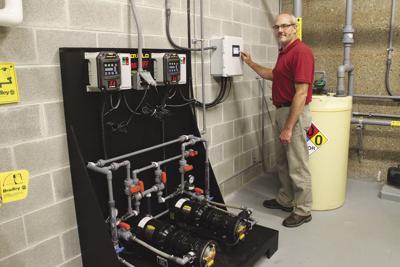AMSTERDAM — After water production in Amsterdam rose to an average of 6 million gallons per day, city chief water plant operator Randy Gardinier requested a leak detection survey be conducted.
Usage peaked in January at a single-day high of 6.4 million gallons.
“If I start to see those averages don't come down, that's when I start to get concerned,” Gardinier said Thursday. “It’s good to do this every so often to protect our resource.”
GPRS, a national subsurface contractor, was hired to conduct an acoustic leak detection survey listening for potential issues with water lines across the entire city. The $21,050 survey was paid for out of the water department’s budget.
The firm identified 31 potential leaks across the system in a report returned to the city last month.
The survey uncovered broken water mains on Steadwell Avenue, Guy Park Avenue, Division Street and Fourth Street. An old service line was also found to be leaking heavily at a vacant lot on Forest Avenue. Those substantial breaks have been repaired by water department staff and reduced average water use by 1 million gallons per day.
“The main breaks they did find weren't something bubbling up out of the ground,” Gardinier said. “They were all underground and that's where they stayed. That’s how they were undetected.”
In the last 10 days, Gardinier said production at the water plant has dropped to an average of 5 million gallons per day. It’s impossible to know exactly how much water was lost each day due to leaks.
At least a portion of the additional 1 million gallons on average being used each day would have been a byproduct of plant operations to backwash filters and perform other processes to treat the increased flow caused by the leaks.
Addressing the leaks will save the city money on chemicals and electricity used to treat water that was pouring into the ground. Eliminating that waste is important to help protect the local water supply serving users in the city and the towns of Amsterdam and Florida.
Despite water being lost to leaks, Gardinier said the city’s reservoirs are mostly full so far this year due in part to the mild and rainy winter.
“Right now, we’re in good shape as far as what we have in storage, this has certainly helped,” Gardinier said of the recent repairs. “That allows us to have more water in storage. You don't know what the summer will bring as far as drought or if you have an emergency.”
Water department staff are gradually investigating and repairing the other leaks identified by the survey alongside their regular duties.
“Those are a lot less of a loss, but they're still a loss,” Gardinier said.
Some of the leaks may originate from residential service lines, which owners would be responsible for correcting. Gardinier could not estimate the potential cost of such repairs.
Owners will be notified in these situations. They can’t be compelled to have the broken water lines repaired, but inaction could eventually prevent water from flowing to impacted properties altogether.
“Obviously, you want it to be done sooner than later because it will get worse, not better,” Gardinier said.









